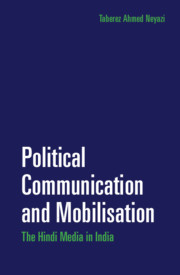Book contents
- Frontmatter
- Dedication
- Contents
- List of Figures, Tables and Maps
- Preface
- Acknowledgements
- Chapter 1 Introduction: Political Communication and Mobilisation in India
- Chapter 2 Under Colonial Rule: Mobilisation in the Hindi and English Press
- Chapter 3 Media and Mobilisation in Independent India
- Chapter 4 Localisation, Grassroots Mobilisation and Hindi News Media
- Chapter 5 Political Economy of the Hindi Press
- Chapter 6 The Hybrid Media System, Anti-corruption Movement and Political Mobilisation
- Chapter 7 Agenda-setting and Mobilisation in a Hybrid Media Environment
- Chapter 8 Conclusion: Politics, Power and Mobilisation in Digital India
- Bibliography
- Index
Chapter 3 - Media and Mobilisation in Independent India
Published online by Cambridge University Press: 17 August 2019
- Frontmatter
- Dedication
- Contents
- List of Figures, Tables and Maps
- Preface
- Acknowledgements
- Chapter 1 Introduction: Political Communication and Mobilisation in India
- Chapter 2 Under Colonial Rule: Mobilisation in the Hindi and English Press
- Chapter 3 Media and Mobilisation in Independent India
- Chapter 4 Localisation, Grassroots Mobilisation and Hindi News Media
- Chapter 5 Political Economy of the Hindi Press
- Chapter 6 The Hybrid Media System, Anti-corruption Movement and Political Mobilisation
- Chapter 7 Agenda-setting and Mobilisation in a Hybrid Media Environment
- Chapter 8 Conclusion: Politics, Power and Mobilisation in Digital India
- Bibliography
- Index
Summary
With India's independence from colonial rule in 1947, the political environment under which the press had to operate was transformed, because most of the authoritarian laws and regulations used by the British to suppress the press were removed. India's first Prime Minister, Jawaharlal Nehru, was an advocate of freedom of speech in general and freedom of press in particular. The Indian press, however, was not merely a passive supporter of the programmes and policies of the Indian state. In this chapter, I analyse the changing political environment under which the press had to operate in newly independent India, and explore the reasons for the subservient position of the Hindi media relative to the English media in the country in the decades after independence.
The Indian press in general was going through profound confusion soon after independence about its role vis-à-vis the state and society. Since the nationalist press had played a prominent role during the freedom struggle by aligning with the Indian nationalist leadership and fighting against colonial rule, the nationalist newspapers could not suddenly detach themselves from this role once colonial rule ended. Rather than critically examining the programmes and policies of the Indian government designed to advance economic and social progress, the nationalist press started supporting the policies and programmes of the Nehru government, at least in its initial years. This support was also due to the lack of any strong opposition in Parliament against Nehru.
The relationship between the media and the state is often mediated by oppositional politics. On occasion, the media alone has been successful in bringing various issues to public scrutiny. But in order to successfully pursue an issue, the media relies on support from oppositional politics, which often feeds and keeps the issue alive by issuing statements. This was not the case in the initial years of the Nehru government because of the media's fixation with Nehru's stature, which led Inder Malhotra (2008) to describe this period as the ‘age of consensus’. However, in reality the 1950s was far from the age of consensus, particularly after the mid-50s, as there were several critical voices. Even the newspaper with the largest circulation, the Times of India, in 1951 was ‘trying to shape itself as an opposition paper to the Nehru administration’ (Mani, 1954, ix).
- Type
- Chapter
- Information
- Political Communication and MobilisationThe Hindi Media in India, pp. 49 - 76Publisher: Cambridge University PressPrint publication year: 2017



